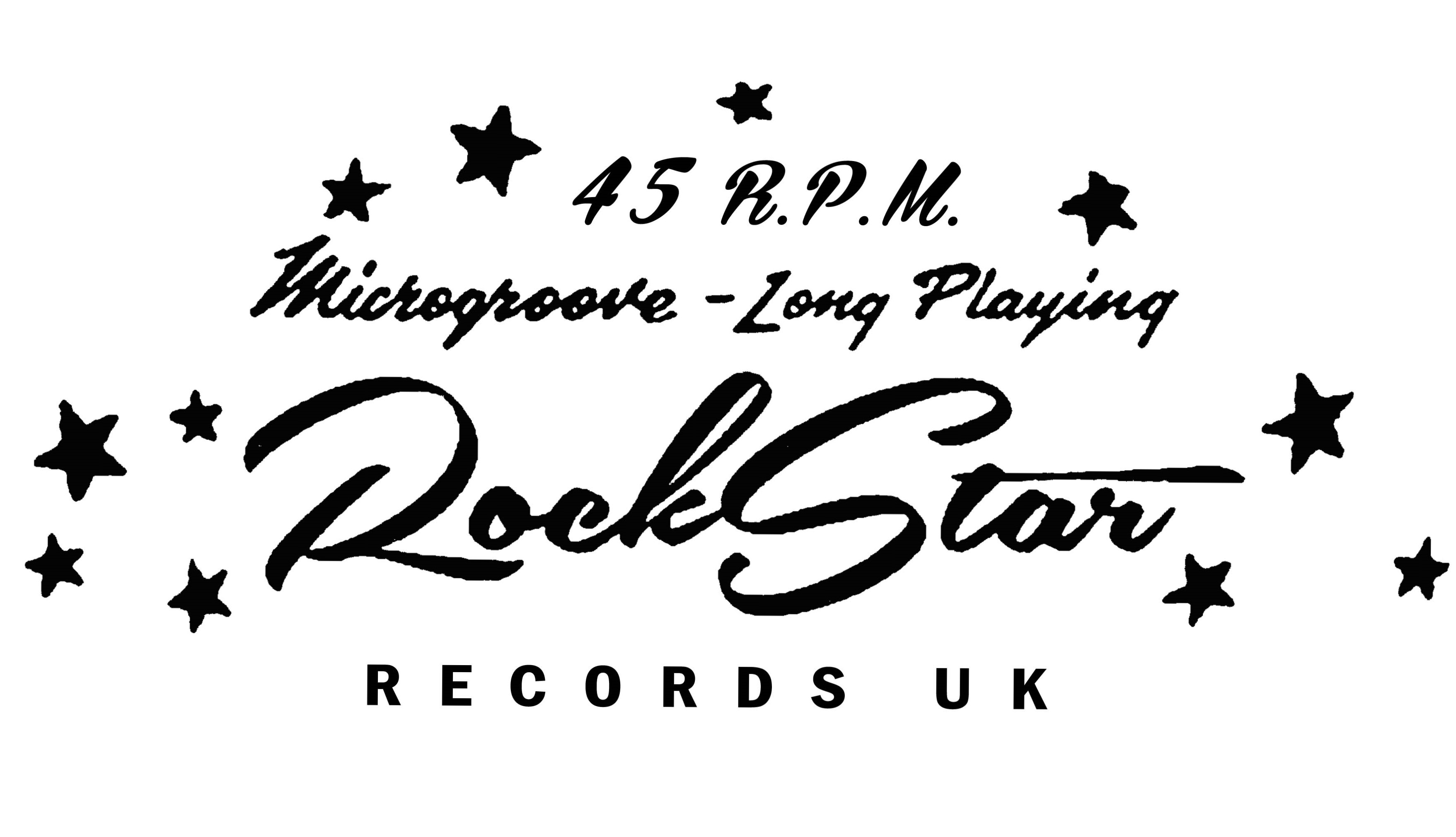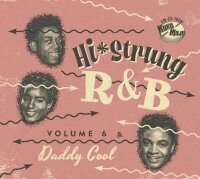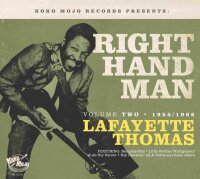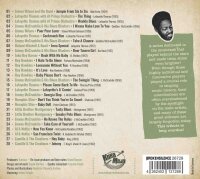
November 2024
Items 1 - 4 of 4
Mark Armstrong presents volume 6 of this brandnew series focused on
"Rhythm & Blues" of African American artists.
Ray Allen - Chains LP 12inch
Lafayette Thomas Vol.2 1954-62
In 1955, Thomas released his third solo single 'The Thing/Weekly Blues', this time on the tiny Trilyte Records label owned by Ollie Hunt. The 'Thing' moniker was a reference to Thomas’s acrobatic stage manners.
1957 saw his fourth solo release, 'Cockroach Run', a great mid-tempo instrumental, paired with a weird novelty flip side credited to The Jumping Judge & His Court.
Thomas continued to record with Jimmy McCracklin & His Blues Blasters throughout the 1950s, and his playing on 'Beer Tavern Girl' is some of his finest work behind McCracklin. That guitar break is pure genius!
He also did one-off sessions in 1957 and 1958 with Juke Boy Bonner (misspelled Barner) and Big Mama Thornton & The Hi-Tones. Thomas is credited on the Thornton sessions, but I don’t hear any guitar on the A-side, and if there's any guitar on the flip, it's buried somewhere deep in the mix. Too bad because both sides are phenomenal!
In 1958, Thomas recorded for the Rhythm Recordings label again (now named Rhythm Records), this time with pianist Roy Hawkins. He released four brilliant tracks that demonstrate the breadth of Thomas’s playing.
Later in 1958, Thomas relocated to New York City, where he worked with piano players Little Brother Montgomery and Memphis Slim. He appears on Montgomery's 'Tasty Blues' LP released in 1961 and Memphis Slim's 'Just Blues' LP, also from 1961 (later reissued as ‘Bluesville’).
In 1959, he released his fifth solo single, 'Please Come Back To Me/Lafayette’s A’ Comin’, on Savoy with Sammy Price on piano.
After his time in New York, Thomas returned to California and collaborated with McCracklin once more, this time contributing to McCracklin's album 'Jimmy McCracklin Sings'. He is also featured on singles by Al & Nettie and with Camille And The Creations.
In 1969, he appeared on an Oakland Blues compilation, and in 1972, he appeared on a Sugar Pie DeSanto single. His last recordings were a couple of Soul/Funk records with Papa & The Utopians and The Luscious Three. Lafayette 'Thing' Thomas died of a heart attack in 1977 in Brisbane, California, at the age of 48.
Dora-Alabama-bred Terry Fell's contribution to the embryotic California music scene is the focus of Atomicat Records' (ACCD 149) Fireball Boogie. The triple ninety-four song CD anthology glorifies the career of Terry Fell. The songs recorded from 1945 to 1963 focus on Fell’s up-tempo recordings, and additionally included are, recordings from his Lode Record label, and artists who recorded his compositions. Within the anthology are 21 unreleased acetates, two of which are from his label signing Sammy Masters.
Terry Fell was never a rocker, he sang country boogie which revivalists happily listened to, and made the style part of the rock ‘n’ roll scene. The album's 16-page sleeve notes will explain about the multi-talented Fell who; sang, played guitar, bass, and mandolin, owned Lode Records, wrote numerous songs, became involved in rock ‘n’ roll music, and this aspect of his career is available on the third CD. The release dates for Fell’s recordings are conflicting, therefore, the information within the booklet has been grouped by the label for ease of reading and explaining. The anthology also includes Fell’s only known TV appearance which was filmed on the 5th of November 1955 at the Ozark Jubilee. Fell was introduced by Red Foley, and sang his October 1955 RCA Victor release That’s What I Like, and the studio band featured guitarist Grady Martin.
Terry Robert Fell was born in Dora, Alabama on the 13th of May 1921, and raised on a farm situated halfway between the cities of Jasper and Cullman. In 1937 he moved to California, and in 1938/39 his family joined him. He undertook voluntary work, developed his musical skills, and spent six months in military service, before finding regular employment as a press man at the Tru-Flex tire manufacturing plant.
In the evenings Fell honed his musical skills and, became a member of Merle Lindsay's Oklahoma Night Riders and shortly afterwards he began to work with Billy Hughes and The Pals of The Pecos. From the association with Everette Ishmael "Billy" Hughes, Fell’s recording and songwriting career began. Between October 1945 and June 1946, Fell recorded three Memo Record label releases which were; I've Done All I Know To Do b/w You Ran Around (While I Was Gone), Paper Heart b/w You Don't Want Me, and There's A Gold Moon Shining (On A Blue, Blue Heart) b/w You're Not Wanted Here. He then signed to the Fargo Record label in 1946 and with His Red River Rangers recorded; Paper Heart b/w You Don't Want Me Any More, and they are radically different in arrangement from Memo recordings.
In mid-1946 Fell signed for Howard Courtney who owned Courtney Records, and from this career move, he recorded as a named artist, and worked uncredited for; Lucky White and Dude Ranch Playboys, Douglas Venable and His Bar X Ranch Hands, and his most active participation was with Leodie Jackson and His Western Swingsters. The sessions and song information from this fertile association are fully explained in the album's sleeve notes.
In 1947 Fell again label hopped and began a short association with the 4 Star Record label which issued Paper Heart b/w You Don't Want Me Any More, and the latter was the second use of the Memo recording. He then recorded three sides for the Guilt-Edge Record label including a boogie version of I Can Hear You Clucking (which he re-cut for RCA Victor). His swansong for the label Hillbilly Impersonations (Twelve Famous Singers) b/w Smoking Cornsilks was released in March 1953. He recorded a 4 Star custom pressing My Pretty Little Japanese b/w Dreamers Paradise for the Northwest Record label as Forrest Field, and the latter title was the Guilt-Edge recording reused. The labels were all associated with the 4 Star Record label, and at this point, Fell ended his association with small labels.
Fell from 1948 onwards had to write an unspecified number of songs a month for Sylvester Long Cross’s American Music, and he branched out with his style as the decades advanced. Fell wrote several songs with a rock 'n' roll appeal, and included on this release are; Curtis Gordon’s 1956 rocker (Mercury 70933X45) Play The Music Louder which is more widely known than Fell’s version. For the Liberty Record label Eddie Cochran sang in 1957 Cradle Baby, and the label posthumously released in 1962 Never, and the UK release erroneously credits Merle Travis as the writer. In 1958 Fell co-wrote the flip side of Jeani Mack's Class Record label recording Dirty Dishes. We include from 1961 Hank Locklin's RCA Victor version of You're The Reason, and from 1962 an energetic version of the truck driver anthem by Bill Woods Truck Driving Man. Which was issued by the Rose Record label
Returning to Fell’s recording career, after a year's hiatus from the recording studio came what is considered Fell’s most well-known recording years. Fell was signed in late 1953 early 1954 to RCA's "X" imprint and recorded five releases for the company with four out of five releases crediting The Fellers. Fell kicked off his new recording association with a four-song session held in March 1954 with the most well-known release being Don't Drop It b/w Truck Driving Man. It was Don't Drop It which gave Fell his first chart hit rising to # 4. The song has been recorded by among many; Tommy Sands, Red Sovine, Betty Amos, Wilbert Harrison, and Jerry Lee Lewis. Truck Driving Man amazingly failed to chart although it went on to become a country standard, amounting to over 90 cover versions by such artists as; The Green River Boys featuring Glen Campbell, Bill Woods, Buck Owens and His Buckaroos, and Rick Nelson.
Five months after his 34th birthday the "X" label severed its association with country music and Fell was signed to its major label RCA Victor. Fell’s new label produced six releases (plus two songs held in the can) and used two of his recordings for a shared EP. One of the sessions resulted in a rerecording of Guilt-Edge title I Can Hear You Cluckin' B/w Don't Do It, Joe. Fell’s swan song for the label Wham! Bam! Hot Ziggity Zam b/w Consolation Prize came from his 10th February 1956 session and failed to create a hit. The top side was from the pen of Aaron Harold Schroeder whose writing credits for others include; A Big Hunk O' Love, I Got Stung, 24 Hours From Tulsa, and many more. The flip side, a country tale of lost love, was vocally strong but dated, and the coupling was unbalanced, and this ended his tenure with RCA Victor.
In 1958 Fell set about establishing his Lode Records and Lode Publishing, he also worked as a session producer and session musician. The in-house company was operated from his home address, 10759, Little Lake Road, Downey, California. Fireball Boogie features several of the labels’ recordings, including Fell’s named sides and his nom de plume Johnny Valentine on the album, the release spotlights his most creative and well-known artist, Sammy Masters. In September 1959 Fell produced two Sammy Masters recordings and leased them to Warner Brothers Record label. The company added reverb to the Rockin' Redwing b/w Lonely Weekend master, and this version was only released in Europe. Fell was unhappy with the over-dubs and released his Lode Record label master sans reverb in 1960, and this version which is included in the release peaked at # 64 in the Billboard charts. Masters also wrote two recordings for Fell to publish which he recorded onto acetate, Hootenanny Hill, and Jenny Come Down, these songs were never commercially released and are made available for the first time on this album.
In April 1960 Fell while managing Lode Records recorded two sides for his publishing agent Sylvester Long Cross's Crest Record label. The release was Y' All Be Good Now b/w Who Who's, Fell wrote the top side and a name that Eddie Cochran fans will recognize Dale Fitzsimmons wrote the flip side. Both of these songs have never been reissued, and we proudly make them available.
Fell after residing in Downey, California for twenty-six years relocated to Nashville, Tennessee in 1962. In Nashville, Fell rarely publicly performed, in part due to throat problems, and worked as a songwriter until he retired. The Lode label activity only began to indicate the Nashville address on its labels in 1975.
The information about Terry Fell is greatly improved from a transcript provided by The Country Music Foundation in Nashville, Tennessee. Patricia Hall’s probing interview with Terry Fell was held on the 12th of December 1975 in Nashville, Tennessee. Fireball Boogie has a sixteen pages booklet and a discography.
The album is housed in an attractively designed cardboard sleeve, specially designed to avoid the use of plastic and be environmentally friendly. The album has a stunning design by artist Urban Zotel and sleeve notes from reissue producer Dee Jay Mark Armstrong. Heiko Schulz at the Black Shack Recordings oversaw the acetate cleaning and The Studio That Time Forgot, El Paso Texas mastered the albums.
Atomicat Records endeavors to use some lesser-known and for some, perhaps more obscure titles and adds something unexpected to every album. The album is ideal for Dee Jays to fill the dance floor with, and for home listening or while cruising around and scaring the neighborhood. You are listening to music from the past and preserving the future! Rockstar Records 'Often imitated, never duplicated.”
All that remains is to say, "Crank up the volume and dig these musical gems.”
Dee Jay Mark Armstrong Bühl, Germany
Items 1 - 4 of 4








